Intersectional vulnerabilities and climate-related health risks among informal outdoor workers in urban Vietnam
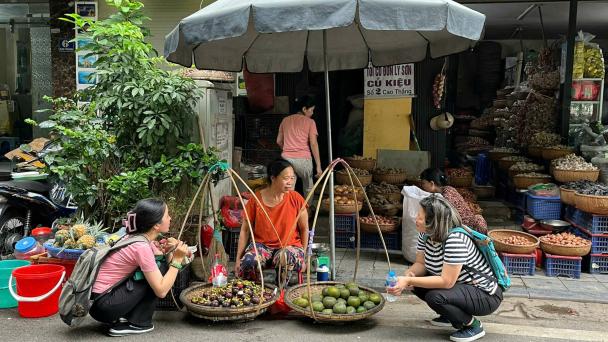
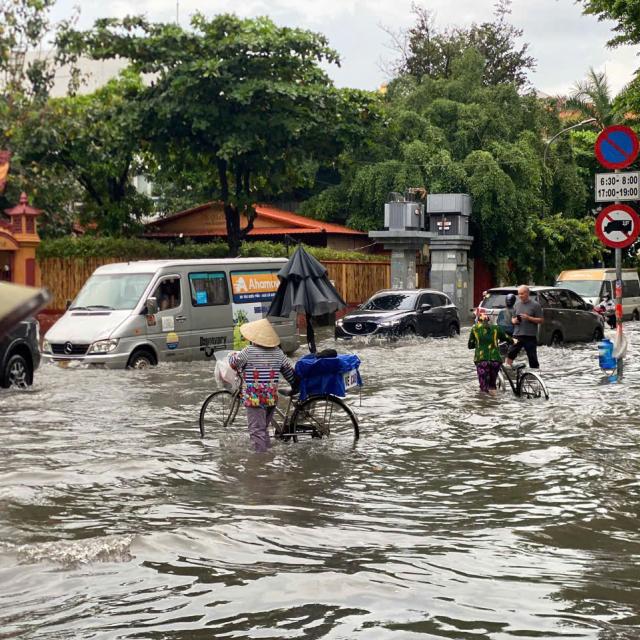

| 
| 
|
This commentary explores the under-examined intersection of climate change and
mental health in South and Southeast Asia, with a particular focus on precarious urban outdoor workers. Despite their acute exposure to climate stressors, these workers remain largely absent from climate-health research and policy. Dominant approaches, rooted in Western biomedical models and standardised methods, fail to account for the cultural, social, and economic realities of affected communities. Drawing on our Wellcome-funded participatory and interdisciplinary research project in Vietnam, we identify knowledge gaps and methodological limitations in current scholarship. We argue for participatory, culturally grounded approaches as essential for inclusive, context-sensitive adaptation strategies, contributing to debates on integrating mental health into climate change response policies in the Global South.
Climate change poses complex, multi-scalar risks to human health, yet its psychological and emotional dimensions remain critically under-examined – particularly in Asia and across the Global South (WHO, 2024; IIED, 2022). In South and Southeast Asia, precarious urban outdoor workers such as street vendors, porters, construction labourers, delivery riders, and waste collectors are among those most exposed to climate hazards. Prolonged, direct exposure to extreme heat, intense rainfall, and deteriorating air quality interacts with structural inequalities to heighten their vulnerability (Habibi et al., 2024; Vu et al., 2025). Despite their critical role in sustaining urban economies, these workers’ mental health experiences are invisible in climate adaptation discourse, research, and policy.
While the climate-health discourse is expanding, mental health remains peripheral. Prevailing approaches dominated by Western biomedical paradigms tend to privilege standardised, individual-level assessments. Such tools often inadequately capture the cultural, social, and occupational contexts that shape both the manifestation of distress and the pathways to care (Berry et al., 2018; Hayes & Poland, 2018). This commentary addresses this gap, using empirical and participatory insights from urban Vietnam to argue for more inclusive, culturally responsive research approaches.
Drawing on Few et al. (2020) we conceptualise culture as a dynamic set of shared norms, values, and practices that mediate community responses to environmental and health challenges. Culture influences how mental health is perceived, how distress is expressed, and which forms of help-seeking are considered legitimate. In South and Southeast Asia, for instance, mental health is framed through spiritual or moral lenses, while stigma of mental illness often constrains access to formal care (Raguram et al, 2001; Cheon and Chiao, 2012). Recognising these cultural dynamics is essential for designing contextually appropriate and socially legitimate interventions. As Few et al. (2020) argue, culture actively shapes climate adaptation processes, shaping how risks are perceived and addressed. It must therefore be central to any inclusive climate–health strategy.
As part of our Wellcome Trust-funded project on the impact of climate change on the
health of urban outdoor workers in Vietnam, we conducted a rapid evidence review on the mental health impacts of climate change on vulnerable populations in these regions. The results revealed a striking absence of comprehensive, contextually grounded research in this domain. Patwary et al.’s systematic literature review likewise identifies major evidence gaps, including a lack of longitudinal studies and objective exposure assessments. The few studies available point to the following: in Thailand, heat stress has been linked to psychological distress, disproportionately affecting younger women (Tawatsupa et al., 2010); in China, heatwaves have been associated with increased psychiatric hospitalisations in the general urban population (Liu et al., 2019); and in India, unpredictable weather patterns have been implicated in rising suicide rates among farmers, largely driven by financial stress following crop failures (Kureshi & Somsundaram, 2018). These findings highlight both the scale of climate–mental health challenges in South and Southeast Asia and the inadequacy of existing research frameworks. While these studies demonstrate important associations between climate and mental health, they rarely capture the nuanced ways in which individuals and communities perceive and respond to these stressors. More importantly, they overlook how wellbeing is defined, experienced, and given meaning within specific cultural and environmental contexts. Much of the existing research relies on standardised, quantitative methods rooted in Western biomedical paradigms, with an emphasis on individual symptoms and clinical interventions. Such approaches – developed in high-income, individualistic contexts with established health systems – do not adequately reflect how wellbeing, resilience, and distress are understood in many Asian societies, and how populations respond (Berry et al., 2018; Hayes & Poland, 2018, Akhtar, 2016).
As a result, prevailing frameworks risk mischaracterising vulnerability and failing to capture the cultural, social, and occupational realities that shape mental health outcomes (e.g. Kim et al., 2024). Addressing these deficits requires mixed-methods research that integrates statistical analysis with qualitative, participatory and co-constructed approaches. Central to this is participatory action research, which reframes participants such as urban outdoor workers not as passive subjects but as active co-producers of knowledge (e.g. Ghosh & Dutta, 2024; Sendall et al., 2018). Through co-construction, communities can articulate their priorities, define locally meaningful indicators, and identify culturally specific stressors – producing evidence that is both empirically rigorous and socially legitimate. By embedding culturally relevant, context-specific insights over externally imposed frameworks, this approach provides an essential foundation for inclusive and effective climate adaptation interventions.
Our Wellcome Trust-funded project in Vietnam was explicitly designed to address the
methodological and epistemological gaps identified above. Employing participatory
vulnerability analysis (PVA) and a co-construction approach, we worked directly with four urban outdoor occupational groups (construction workers, street vendors, motorbike taxi riders, and porters), to identify their perceptions and experiences of climate change-induced health risks, including both physical and mental health challenges. This design embedded worker community perspectives into every stage—from defining key indicators to interpreting findings and shaping impact outreach—ensuring both contextual accuracy and policy relevance.
Our quantitative survey results showed that 41% of respondents reported exhaustion and sleep disturbances linked to extreme weather, 30% experienced anxiety and stress from sudden weather changes, 3.5% reported worsening depressive symptoms, and 7% expressed feelings of hopelessness associated with weather-related disasters. We also found that mental health vulnerability varied by age, with 50% of workers aged 30-45 reporting stress from weather changes, compared to only 7.5% of those over sixty. Gender disparities also exist, with 43.3% of women affected versus 35.7% of men. Despite these challenges, 36.6% did not seek mental health treatment, highlighting persistent systemic and cultural barriers to care.
Qualitative findings added depth to these patterns of survey response. Participants
described persistent anxiety during prolonged heatwaves, especially when weather
disruptions led to income loss: “When the heat lasts for days, I can’t go out to sell.
Staying home means I worry about losing income and not having enough to pay debts” (female, street vendor, Hanoi). Outdoor work in extreme heat was associated with physical depletion and emotional strain: “Working outside under burning sun leaves me constantly tired, easily irritable, and at night I just want to sleep, not talk to anyone” (male, construction worker, Ho Chi Minh City). Others voiced uncertainty about the future: “Every year the weather gets more unpredictable; I worry about how much longer I can keep doing this job” (male, motorbike taxi driver, Da Nang). Stigma surrounding mental distress further limited open discussion and care-seeking: “Feelings of sadness or worry are kept inside; if you talk about them, people say you’re weak” (female, scrap collector, Can Tho).
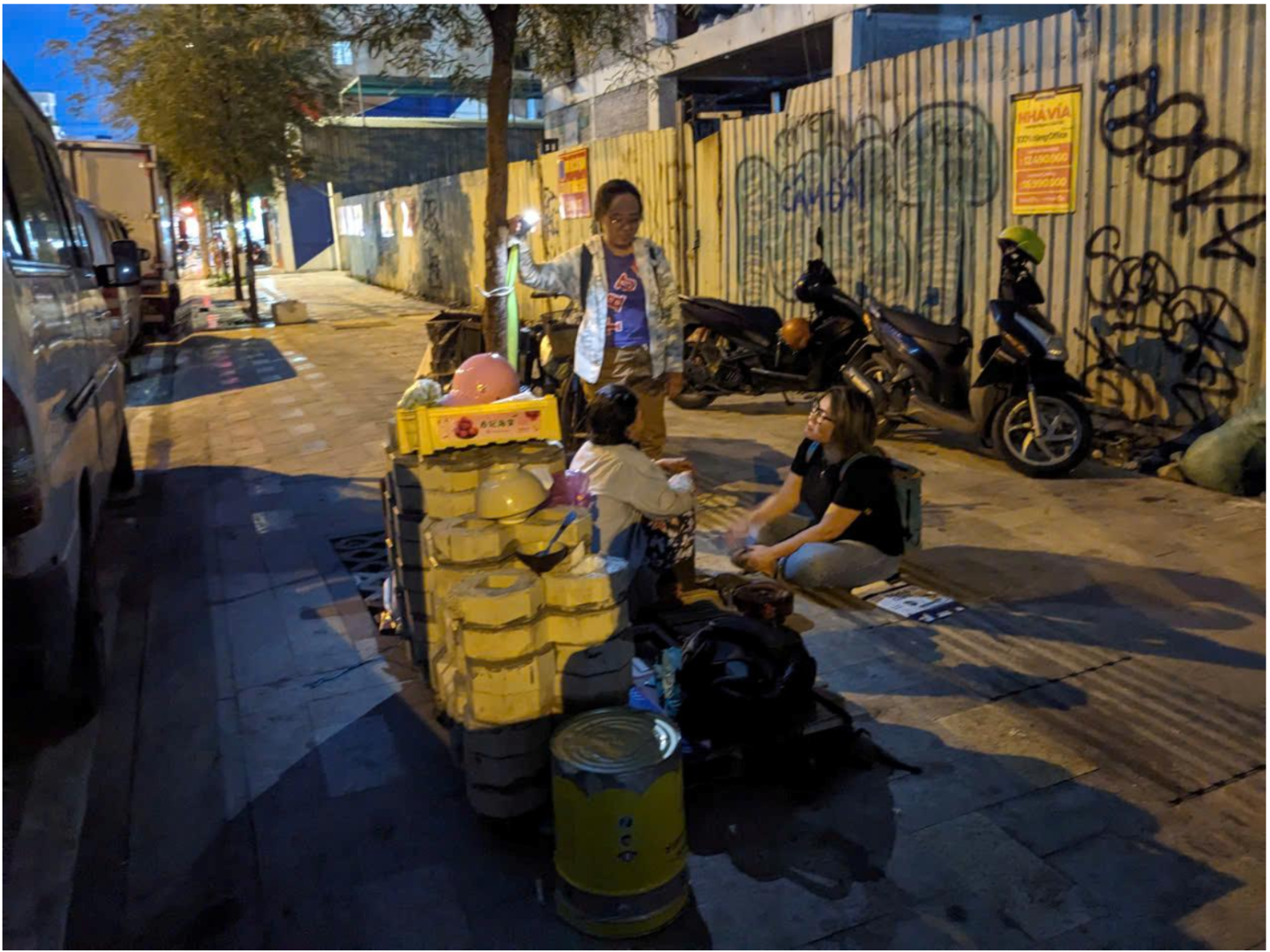
These narratives reveal the intertwined effects of climatic stressors, livelihood insecurity, and cultural norms on mental wellbeing. They also highlight the limitations of
standardised diagnostic tools in capturing such complex realities. By combining co-
developed indicators with locally resonant language and lived experience, the project
was able to reveal hidden dimensions of vulnerability and inform adaptation strategies that are both evidence-based and socially acceptable.
A growing body of scholarship highlights culture as a central mediator in how communities perceive, experience, and respond to climate-related risks (Few et al., 2020). Cultural norms shape whether distress is expressed openly or internalised, the legitimacy of different coping strategies, and the acceptability of seeking formal mental health care. In many Asian contexts, spiritual and moral framings of wellbeing coexist with stigma that suppresses open discussion of psychological distress, as illustrated by workers’ reluctance to disclose symptoms for fear of being perceived as “weak.” One 45-year-old construction worker in Hanoi stated: “A man who complains it’s too hot to work will be laughed at”.
Local knowledge offers an essential counterpoint to externally imposed models.
Communities possess generational insights into environmental change, its health
consequences, and locally appropriate coping mechanisms – ranging from informal peer support to faith-based practices and collective action (Smith et al., 2024). In Vietnam, for example, our participants described relying on neighbourhood networks and advice from community elders during heatwaves – strategies that were both socially resonant and sustained everyday resilience. Such resources, though often marginalised informal adaptation and health policy frameworks, are integral to protecting mental wellbeing.
Participatory research methods such as PVA, co-design, and community-led inquery
provide epistemologically inclusive pathways for integrating this knowledge (Cornwall and Jewkes, 1995). In our project, co-construction through participatory action research enabled outdoor workers to define relevant indicators, identify culturally specific stressors, and co-develop practical tools such as the Intelligent Climate Alert Network (ICAN)
1
app to safeguard workers’ health. This approach did not simply “add” local perspectives to pre-existing frameworks; it reoriented the research process so that community priorities and lived realities structured the knowledge produced.
By bridging quantitative evidence with qualitative, participatory, and co-constructed insights, researchers can move beyond diagnostic deficit models towards holistic, culturally responsive interventions that address both the psychological and socio-economic dimensions of climate vulnerability.
Addressing the mental health impacts of climate change requires a shift away from
standardised, top-down models toward participatory, context-sensitive and culturally grounded approaches. Climate-related psychological distress not only erodes individual wellbeing but can also diminish workforce productivity, strain health systems, and contribute to broader social instability – effects that cascade across families,
communities, and entire economies (e.g. Reuters, 2025).
Investing in locally grounded research that engages vulnerable populations, such as informal urban workers, can illuminate hidden forms of distress and inform more effective, preventive interventions. Such efforts are central to building equitable and resilient societies in the face of accelerating climate challenges. While Western paradigms offer valuable methodological and clinical insights, these must be critically adapted to reflect the cultural norms, knowledge systems, and lived experiences of the communities most affected.
Integrating diverse epistemological traditions with inclusive, participatory methodologies enriches the contextual relevance and analytical depth of climate–mental health research. Such approaches can be operationalised through mechanisms such as National Adaptation Plans (NAPs), urban climate resilience strategies, and sectoral
health-climate action plans, ensuring that policies are not only evidence-based but also socially acceptable and locally grounded.
Global evidence demonstrates that climate-related hazards such as wildfires, floods, and extreme heat profoundly elevate PTSD, anxiety, and depression rates—even in high-income settings (Mishra, 2025). The stakes are higher in the Global South, where
vulnerabilities are compounded by socio-economic inequalities and limited health
infrastructure. Embedding cultural and participatory perspectives into climate adaptation is therefore not optional—it is essential for achieving equitable, enduring, and
contextually relevant climate–mental health strategies.
This work is funded by Wellcome Trust [grant number 227993/Z/23/Z].
Abdallah, D., Vu, A.N., Nguyen, L.D. and Rigg, J., 2025. Rethinking climate–mental health research in South and Southeast Asia: Participatory insights from Vietnam. [Commentary]. National Centre for Social Research.

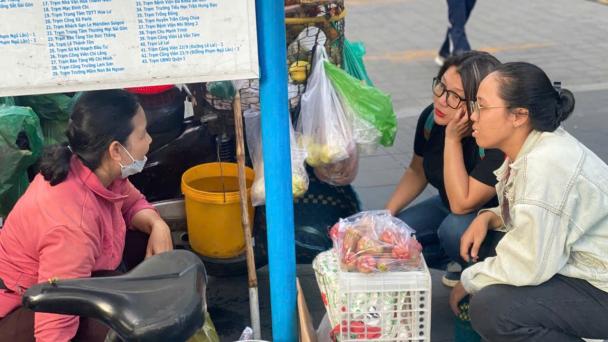

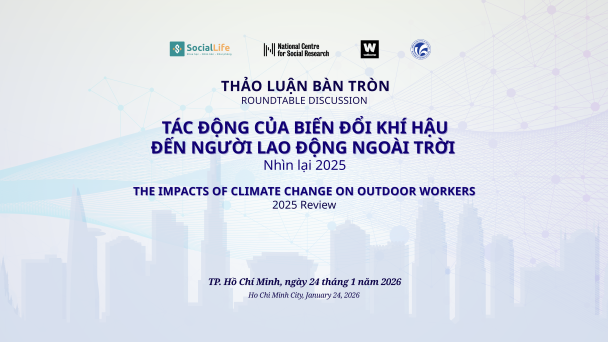
Receive a regular update, sent directly to your inbox, with a summary of our current events, research, blogs and comment.
Subscribe